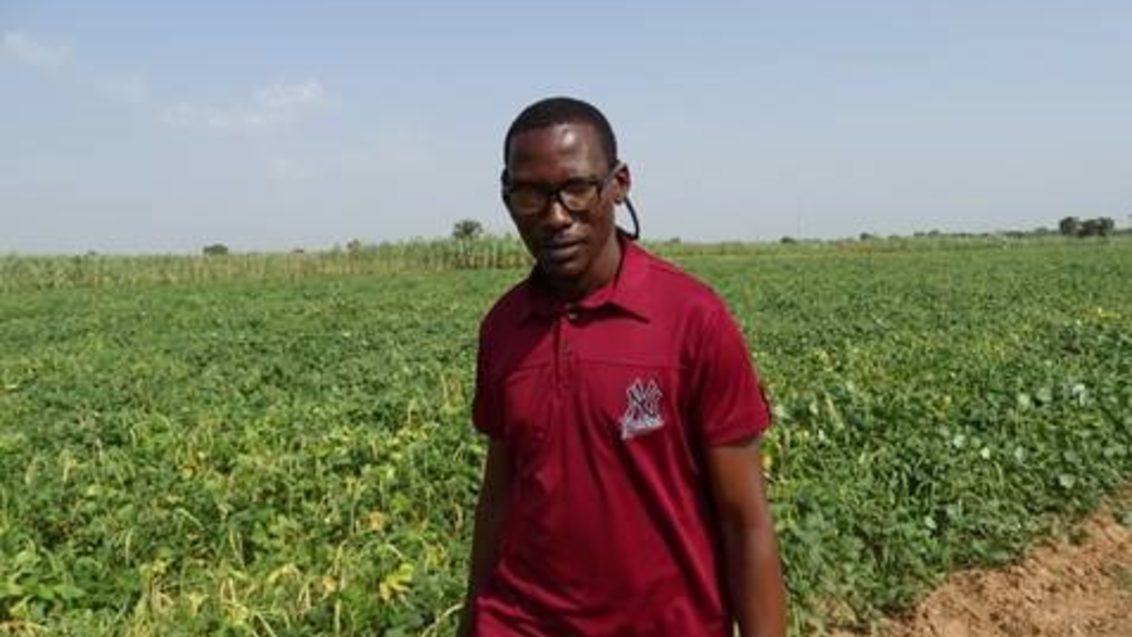‘Great farmers, great nation - no farmers, no nation’

Get to know more about our staff in the field who makes the lives of smallholders better every day. We discussed with Isaiah Gabriel, working in Nigeria. Isaiah is responsible to provide advice and support to Yieldwise, a program focusing on post-harvest losses, especially in the tomato value-chain, supported by the Rockefeller Foundation and primarily implemented by TechnoServe. Isaiah has a background in agronomy and breeding & genetics with several years of work experience as Assistant Farm Manager, Senior Agronomist / Field Coordinator, Demand Promoter, and Research Promoter for different organizations, including Syngenta. Here is what he has to say.
My background
“I was born in the late ’70s in the sleepy town of Agenebode in Edo State, southern Nigeria. Although from a humble background, I bagged a B. Agric in Agronomy from the prestigious Federal University of Agriculture in Makurdi. Against the odds, I went on to obtain my M.Sc in Plant Breeding and Molecular Genetics there in 2014. Parallel to my job at the Foundation, I am currently researching for a Ph.D. in Plant Breeding and Genetics. My wife Inemesit and I have two boys, Samuel and William.
Before joining the Syngenta Foundation (SFSA) in 2018 as a Project Coordinator, I’d already clocked up valuable experience as a plant breeder, agronomist, and seed expert. From 2014 to 2017, I worked for Syngenta Nigeria, first in seed production in Kano State and then as a Senior Agronomist/Field Coordinator in Delta State. After that, I helped achieve a turnaround at Rayuwa Farms, Nassarawa State, which had been struggling to survive commercially.”
My motivation
“For me, the famous slogan ‘Great farmers - great nation, no farmer - no nation’ is like a propeller. It’s a strong motivational message, especially as our present government pays little or no attention to agriculture. I want to help smallholders adopt new technology and get access to better seed that will increase their productivity and improve their lives.”
What we do, and how
“I’m responsible for developing the seed system. That means providing farmers with a profitable alternative to the endless reuse of seed, which leads to poor yields. My colleagues and I are team players, and what I call “partners in progress”: We devote all our professional energy to improving smallholders’ lives.”
How can SFSA change smallholders' lives?
“Our Seeds2B stream touches the very heart of farming. Smallholders’ most important ingredient for a good harvest is their choice of high-yielding seed adapted to local growing conditions. They naturally also have to consider aspects like soil fertility, watering and weed control. But better seed quality alone raises productivity by at least 10-15%. To achieve high quality, seed production has to keep a close eye on genetic purity and other factors. High production standards cost a lot of effort, but pay excellent dividends in seed health, germination rates, and vigor.
Alongside our seed work in the AVISA initiative, we are also implementing a local version of the SFSA Farmers’ Hub pioneered in Bangladesh. This model enables entrepreneurial young rural people to build up a business serving neighboring smallholders, which represents a real ‘win-win’. The Foundation’s work perfectly matches my personal aim: to give farmers the best at all times.
What are you proud of?
I’ve made significant progress in discouraging farmers from always recycling diseased seed of outdated varieties. In northern Nigeria, particularly, growing numbers of farmers now buy improved seeds from local companies. That represents a clean break from the past, and it is visibly increasing yields. I am also proud to be encouraging smallholders to stagger their crops and enable continuous harvesting throughout the wet and dry seasons. This is good both for their incomes and for year-round availability of food.
What's next?
One of our Foundation’s long-standing strengths is its Policy work. In Nigeria, the frequent absence of good agricultural policies has been a major cause of underdevelopment. So I’d like to help the government formulate policies that will make food more available and affordable at home and abroad. Coupled with the introduction of new technologies for smallholders, that would contribute to an agrarian revolution. Nigeria very much needs one!
